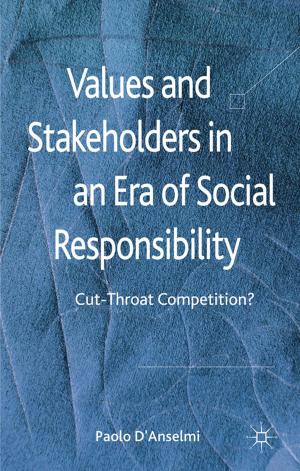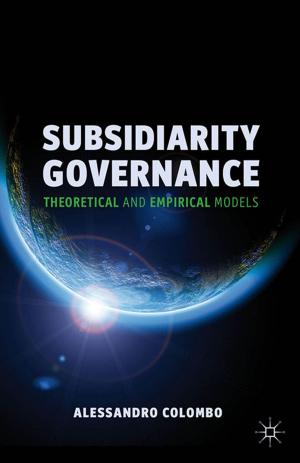Anti-Racist Practice in Social Work
Nonfiction, Social & Cultural Studies, Political Science, Politics, Social Services & Welfare, Social Science, Social Work| Author: | Kish Bhatti-Sinclair, Robert Adams, Lena Dominelli, Malcolm Payne | ISBN: | 9780230345553 |
| Publisher: | Palgrave Macmillan | Publication: | February 15, 2011 |
| Imprint: | Palgrave Macmillan | Language: | English |
| Author: | Kish Bhatti-Sinclair, Robert Adams, Lena Dominelli, Malcolm Payne |
| ISBN: | 9780230345553 |
| Publisher: | Palgrave Macmillan |
| Publication: | February 15, 2011 |
| Imprint: | Palgrave Macmillan |
| Language: | English |
Concerns about social justice and equality are woven into the history
of social work and welfare, yet practitioners and service users continue
to experience discrimination. While the obstacles to real equality are
constantly changing, the need remains for social work practice that is inclusive,
empowering and respectful of society's ethnic diversity.
This essential text offers a critical exploration of the issues surrounding
'race' and racism within contemporary social work education and practice.
It offers an overview of current legislation, policy and procedure, and
considers the future of anti-racist practice within the multi-agency
context.
Using a range of exercises to encourage the reader to reflect on their
personal attitudes and assumptions, the author:
■ interrogates ideas of racial identity and self-identity, and demonstrates
how 'race' can be seen as a social construct
■ champions participative approaches and explores the role of the
service user in ensuring equality within future services
■ assesses the impact of globalization and internationalism on antiracist
service delivery.
Incorporating research data, theoretical and practice models, and a
variety of learning resources, Anti-Racist Practice in Social Work is designed
to equip the reader with the knowledge and skills to defend and promote
anti-racist practice in the twenty-first century. This makes it essential
reading for all students of social work and related disciplines, along with
social work practitioners at every level.
of social work and welfare, yet practitioners and service users continue
to experience discrimination. While the obstacles to real equality are
constantly changing, the need remains for social work practice that is inclusive,
empowering and respectful of society's ethnic diversity.
This essential text offers a critical exploration of the issues surrounding
'race' and racism within contemporary social work education and practice.
It offers an overview of current legislation, policy and procedure, and
considers the future of anti-racist practice within the multi-agency
context.
Using a range of exercises to encourage the reader to reflect on their
personal attitudes and assumptions, the author:
■ interrogates ideas of racial identity and self-identity, and demonstrates
how 'race' can be seen as a social construct
■ champions participative approaches and explores the role of the
service user in ensuring equality within future services
■ assesses the impact of globalization and internationalism on antiracist
service delivery.
Incorporating research data, theoretical and practice models, and a
variety of learning resources, Anti-Racist Practice in Social Work is designed
to equip the reader with the knowledge and skills to defend and promote
anti-racist practice in the twenty-first century. This makes it essential
reading for all students of social work and related disciplines, along with
social work practitioners at every level.
Concerns about social justice and equality are woven into the history
of social work and welfare, yet practitioners and service users continue
to experience discrimination. While the obstacles to real equality are
constantly changing, the need remains for social work practice that is inclusive,
empowering and respectful of society's ethnic diversity.
This essential text offers a critical exploration of the issues surrounding
'race' and racism within contemporary social work education and practice.
It offers an overview of current legislation, policy and procedure, and
considers the future of anti-racist practice within the multi-agency
context.
Using a range of exercises to encourage the reader to reflect on their
personal attitudes and assumptions, the author:
■ interrogates ideas of racial identity and self-identity, and demonstrates
how 'race' can be seen as a social construct
■ champions participative approaches and explores the role of the
service user in ensuring equality within future services
■ assesses the impact of globalization and internationalism on antiracist
service delivery.
Incorporating research data, theoretical and practice models, and a
variety of learning resources, Anti-Racist Practice in Social Work is designed
to equip the reader with the knowledge and skills to defend and promote
anti-racist practice in the twenty-first century. This makes it essential
reading for all students of social work and related disciplines, along with
social work practitioners at every level.
of social work and welfare, yet practitioners and service users continue
to experience discrimination. While the obstacles to real equality are
constantly changing, the need remains for social work practice that is inclusive,
empowering and respectful of society's ethnic diversity.
This essential text offers a critical exploration of the issues surrounding
'race' and racism within contemporary social work education and practice.
It offers an overview of current legislation, policy and procedure, and
considers the future of anti-racist practice within the multi-agency
context.
Using a range of exercises to encourage the reader to reflect on their
personal attitudes and assumptions, the author:
■ interrogates ideas of racial identity and self-identity, and demonstrates
how 'race' can be seen as a social construct
■ champions participative approaches and explores the role of the
service user in ensuring equality within future services
■ assesses the impact of globalization and internationalism on antiracist
service delivery.
Incorporating research data, theoretical and practice models, and a
variety of learning resources, Anti-Racist Practice in Social Work is designed
to equip the reader with the knowledge and skills to defend and promote
anti-racist practice in the twenty-first century. This makes it essential
reading for all students of social work and related disciplines, along with
social work practitioners at every level.















